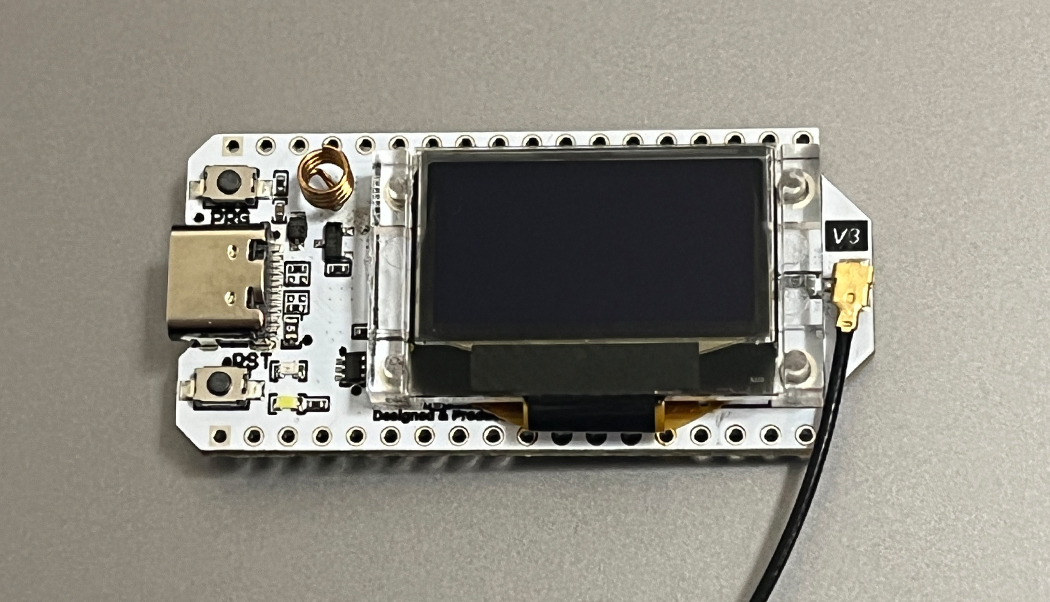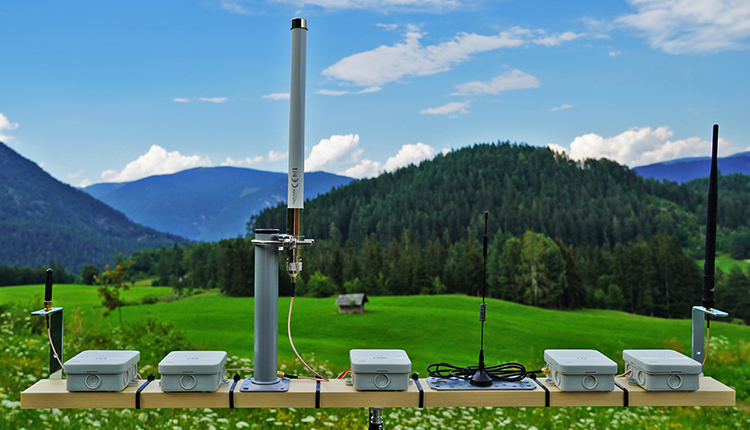Daly BMS Fernauslesen mit LoRaWAN
05.12.2025
Elektronik | Funk | Software
Der Technik-Blog
Auf dieser Seite befindet sich der vollständige Beispielcode für das Projekt TTGO LoRaWAN GPS Tracker. Die Software beinhaltet eine Funktion zur Auswertung der seriell vom GPS-Modul gesendeten Positionsdaten im NMEA 0183 Format. Positionsdaten werden automatisch in den Dezimalgrad (LAT, LON) umgerechnet. Als Aktivierung für das LoRaWAN-Netzwerk wird OTTA verwendet.
Hinweis: Die Pinbelegungen (LoRa, SPI & Serial) sind für eine bestimmte Hardware-Version definiert und müssen möglicherweise angepasst werden. Nähere Information dazu nachfolgend bzw. im Hauptartikel.
Felder mit {FILLMEIN} müssen durch die jeweiligen Schlüssel vom LoraWAN Netzwerk ersetzt werden. Dieses Projekt ist mit TTN (V2) und dem Nachfolger TTS (V3) bzw. mit dem LoRaWAN-Standard 1.0.3 kompatibel.
Hauptartikel: TTGO LoRaWAN GPS Tracker
LoRaWAN GPS Tracker Source Code (ABP)
ESP32 Installation Arduino IDE (mit TTGO Board kompatibel)
Versionsinformation zum Testzeitpunkt:
-> IDE Version: Arduino 1.8.10Achtung: Die Frequenzkonfiguration (868 MHz, EU-Band) muss in der Library-Config überprüft bzw. gegebenenfalls angepasst werden, da sonnst keine Kommunikation in Europa mit einem Gateway möglich ist!
/*************************************************************************************************** Copyright (c) 2015 Thomas Telkamp and Matthijs Kooijman Permission is hereby granted, free of charge, to anyone obtaining a copy of this document and accompanying files, to do whatever they want with them without any restriction, including, but not limited to, copying, modification and redistribution. NO WARRANTY OF ANY KIND IS PROVIDED. This uses ABP (Activation-by-personalisation), where a DevAddr and Session keys are preconfigured (unlike OTAA, where a DevEUI and application key is configured, while the DevAddr and session keys are assigned/generated in the over-the-air-activation procedure). Note: LoRaWAN per sub-band duty-cycle limitation is enforced (1% in g1, 0.1% in g2), but not the TTN fair usage policy (which is probably violated by this sketch when left running for longer)! To use this sketch, first register your application and device with the things network, to set or generate a DevAddr, NwkSKey and AppSKey. Each device should have their own unique values for these fields. Do not forget to define the radio type correctly in config.h. ------------------------------------------------------------------------------------------------- This sample code has been adapted for LILYGO V1.1 GPS LoRa Board. Further information: https://www.aeq-web.com/ttgo-lilygo-esp32-gps-lora-board-lmic-abp-source-code/ ***************************************************************************************************/ #include <lmic.h> #include <hal/hal.h> #include <SPI.h> #define SERIAL1_RX 34 // GPS_TX -> 34 #define SERIAL1_TX 12 // 12 -> GPS_RX String read_sentence; uint8_t tx_payload[11]; boolean join_success = false; // // For normal use, we require that you edit the sketch to replace FILLMEIN // with values assigned by the TTN console. However, for regression tests, // we want to be able to compile these scripts. The regression tests define // COMPILE_REGRESSION_TEST, and in that case we define FILLMEIN to a non- // working but innocuous value. // #ifdef COMPILE_REGRESSION_TEST # define FILLMEIN 0 #else # warning "You must replace the values marked FILLMEIN with real values from the TTN control panel!" # define FILLMEIN (#dont edit this, edit the lines that use FILLMEIN) #endif // This EUI must be in little-endian format, so least-significant-byte // first. When copying an EUI from ttnctl output, this means to reverse // the bytes. For TTN issued EUIs the last bytes should be 0xD5, 0xB3, // 0x70. static const u1_t PROGMEM APPEUI[8] = { FILLMEIN }; void os_getArtEui (u1_t* buf) { memcpy_P(buf, APPEUI, 8); } // This should also be in little endian format, see above. static const u1_t PROGMEM DEVEUI[8] = { FILLMEIN }; void os_getDevEui (u1_t* buf) { memcpy_P(buf, DEVEUI, 8); } // This key should be in big endian format (or, since it is not really a // number but a block of memory, endianness does not really apply). In // practice, a key taken from ttnctl can be copied as-is. static const u1_t PROGMEM APPKEY[16] = { FILLMEIN }; void os_getDevKey (u1_t* buf) { memcpy_P(buf, APPKEY, 16); } static osjob_t sendjob; // Schedule TX every this many seconds (might become longer due to duty // cycle limitations). const unsigned TX_INTERVAL = 60; //LoRa pin mapping ESP32 (LILYGO Board V1.1) const lmic_pinmap lmic_pins = { .nss = 18, .rxtx = LMIC_UNUSED_PIN, .rst = 23, .dio = {26, 33, 32}, }; void printHex2(unsigned v) { v &= 0xff; if (v < 16) Serial.print('0'); Serial.print(v, HEX); } void onEvent (ev_t ev) { Serial.print(os_getTime()); Serial.print(": "); switch (ev) { case EV_SCAN_TIMEOUT: Serial.println(F("EV_SCAN_TIMEOUT")); break; case EV_BEACON_FOUND: Serial.println(F("EV_BEACON_FOUND")); break; case EV_BEACON_MISSED: Serial.println(F("EV_BEACON_MISSED")); break; case EV_BEACON_TRACKED: Serial.println(F("EV_BEACON_TRACKED")); break; case EV_JOINING: Serial.println(F("EV_JOINING")); break; case EV_JOINED: Serial.println(F("EV_JOINED")); { u4_t netid = 0; devaddr_t devaddr = 0; u1_t nwkKey[16]; u1_t artKey[16]; LMIC_getSessionKeys(&netid, &devaddr, nwkKey, artKey); Serial.print("netid: "); Serial.println(netid, DEC); Serial.print("devaddr: "); Serial.println(devaddr, HEX); Serial.print("AppSKey: "); for (size_t i = 0; i < sizeof(artKey); ++i) { if (i != 0) Serial.print("-"); printHex2(artKey[i]); } Serial.println(""); Serial.print("NwkSKey: "); for (size_t i = 0; i < sizeof(nwkKey); ++i) { if (i != 0) Serial.print("-"); printHex2(nwkKey[i]); } Serial.println(); join_success = true; } // Disable link check validation (automatically enabled // during join, but because slow data rates change max TX // size, we don't use it in this example. LMIC_setLinkCheckMode(0); break; /* || This event is defined but not used in the code. No || point in wasting codespace on it. || || case EV_RFU1: || Serial.println(F("EV_RFU1")); || break; */ case EV_JOIN_FAILED: Serial.println(F("EV_JOIN_FAILED")); break; case EV_REJOIN_FAILED: Serial.println(F("EV_REJOIN_FAILED")); break; case EV_TXCOMPLETE: Serial.println(F("EV_TXCOMPLETE (includes waiting for RX windows)")); if (LMIC.txrxFlags & TXRX_ACK) Serial.println(F("Received ack")); if (LMIC.dataLen) { Serial.print(F("Received ")); Serial.print(LMIC.dataLen); Serial.println(F(" bytes of payload")); } // Schedule next transmission os_setTimedCallback(&sendjob, os_getTime() + sec2osticks(TX_INTERVAL), do_send); break; case EV_LOST_TSYNC: Serial.println(F("EV_LOST_TSYNC")); break; case EV_RESET: Serial.println(F("EV_RESET")); break; case EV_RXCOMPLETE: // data received in ping slot Serial.println(F("EV_RXCOMPLETE")); break; case EV_LINK_DEAD: Serial.println(F("EV_LINK_DEAD")); break; case EV_LINK_ALIVE: Serial.println(F("EV_LINK_ALIVE")); break; /* || This event is defined but not used in the code. No || point in wasting codespace on it. || || case EV_SCAN_FOUND: || Serial.println(F("EV_SCAN_FOUND")); || break; */ case EV_TXSTART: Serial.println(F("EV_TXSTART")); break; case EV_TXCANCELED: Serial.println(F("EV_TXCANCELED")); break; case EV_RXSTART: /* do not print anything -- it wrecks timing */ break; case EV_JOIN_TXCOMPLETE: Serial.println(F("EV_JOIN_TXCOMPLETE: no JoinAccept")); break; default: Serial.print(F("Unknown event: ")); Serial.println((unsigned) ev); break; } } void do_send(osjob_t* j) { // Check if there is not a current TX/RX job running if (LMIC.opmode & OP_TXRXPEND) { Serial.println(F("OP_TXRXPEND, not sending")); } else { // Prepare upstream data transmission at the next possible time. Serial.print("Payload: "); int x = 0; while (x < sizeof(tx_payload)) { printHex2(tx_payload[x]); Serial.print(" "); x++; } Serial.println(); LMIC_setTxData2(1, tx_payload, sizeof(tx_payload), 0); Serial.println(F("Packet queued")); } // Next TX is scheduled after TX_COMPLETE event. } void setup() { Serial.begin(115200); Serial.println("Starting"); Serial1.begin(9600, SERIAL_8N1, SERIAL1_RX, SERIAL1_TX); //SPI pin mapping ESP32 (LILYGO Board V1.1) SPI.begin(5, 19, 27, 18); #ifdef VCC_ENABLE // For Pinoccio Scout boards pinMode(VCC_ENABLE, OUTPUT); digitalWrite(VCC_ENABLE, HIGH); delay(1000); #endif // LMIC init os_init(); // Reset the MAC state. Session and pending data transfers will be discarded. LMIC_reset(); // Start job (sending automatically starts OTAA too) do_send(&sendjob); //Set FS for RX2 (SF9 = TTN,TTS EU) LMIC.dn2Dr = DR_SF9; } void loop() { os_runloop_once(); if (join_success == true) { read_sentence = Serial1.readStringUntil(13); //13 = return (ASCII) read_sentence.trim(); if (read_sentence.startsWith("$GPGGA")) { String gps_lat = sentence_sep(read_sentence, 2); //Latitude in degrees & minutes String gps_lon = sentence_sep(read_sentence, 4); //Longitude in degrees & minutes String gps_sat = sentence_sep(read_sentence, 7); String gps_hgt = sentence_sep(read_sentence, 9); String gps_lat_o = sentence_sep(read_sentence, 3); //Orientation (N or S) String gps_lon_o = sentence_sep(read_sentence, 5); //Orientation (E or W) /* Serial.print("LAT: "); Serial.print(Latitude); Serial.print(" LON: "); Serial.print(Longitude); Serial.print(" ALT: "); Serial.print(Altitude); Serial.print(" SAT: "); Serial.println(Sat); */ float Latitude = convert_gps_coord(gps_lat.toFloat(), gps_lat_o); float Longitude = convert_gps_coord(gps_lon.toFloat(), gps_lon_o); float Altitude = gps_hgt.toFloat(); int Sat = gps_sat.toInt(); generate_payload(Latitude, Longitude, Altitude, Sat); } } } String sentence_sep(String input, int index) { int finder = 0; int strIndex[] = { 0, -1 }; int maxIndex = input.length() - 1; for (int i = 0; i <= maxIndex && finder <= index; i++) { if (input.charAt(i) == ',' || i == maxIndex) { finder++; strIndex[0] = strIndex[1] + 1; strIndex[1] = (i == maxIndex) ? i + 1 : i; } } return finder > index ? input.substring(strIndex[0], strIndex[1]) : ""; } float convert_gps_coord(float deg_min, String orientation) { double gps_min = fmod((double)deg_min, 100.0); int gps_deg = deg_min / 100; double dec_deg = gps_deg + ( gps_min / 60 ); if (orientation == "W" || orientation == "S") { dec_deg = 0 - dec_deg; } return dec_deg; } void generate_payload(double lat, double lon, int alt, int sat) { uint32_t LatitudeBinary = ((lat + 90) * 1000000); uint32_t LongitudeBinary = ((lon + 180) * 1000000); uint8_t payload[11]; payload[0] = ( LatitudeBinary >> 24 ) & 0xFF; payload[1] = ( LatitudeBinary >> 16 ) & 0xFF; payload[2] = ( LatitudeBinary >> 8 ) & 0xFF; payload[3] = LatitudeBinary & 0xFF; payload[4] = ( LongitudeBinary >> 24 ) & 0xFF; payload[5] = ( LongitudeBinary >> 16 ) & 0xFF; payload[6] = ( LongitudeBinary >> 8 ) & 0xFF; payload[7] = LongitudeBinary & 0xFF; payload[8] = ( alt >> 8 ) & 0xFF; payload[9] = alt & 0xFF; payload[10] = sat & 0xFF; int i = 0; while (i < sizeof(payload)) { tx_payload[i] = payload[i]; i++; } }

Einstieg in das LoRaWAN (TTN) mit dem Heltec LoRa32 V3 und Einrichtung vom Board in der Arduino IDE
Weiterlesen
LoRa ist eine sehr beliebte Technologie für IoT und Mikrocontroller. In diesem Artikel geht es um die besten LoRa Antennen und den großen Reichweite Test
WeiterlesenAEQ-WEB © 2015-2026 All Right Reserved